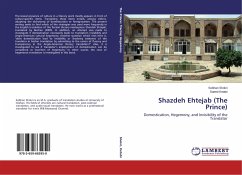The lexical presence of culture in a literary work mostly appears in form of culture-specific items. Translating these items entails, among others, adopting the dichotomy of domestication or foreignization. The present writing seeks to find which of the strategies was used more frequently in the English translation of the Persian literary masterpiece Shazdeh Ehtejab, translated by Buchan (2005). In addition, an attempt was made to investigate if domestication necessarily leads to translator's invisibility and Anglo-American cultural hegemony. Another question which rises here is, "does domestication lead to invisibility or shadowy existence of the translator in his/her translation by submitting to the canon of fluency and transparency in the Anglo-American literary translation?" Also, it is investigated to see if translator's employment of domestication can be considered as 'insertion of hegemony.' In other words, the root of hegemonic translation is investigated in this book.
Bitte wählen Sie Ihr Anliegen aus.
Rechnungen
Retourenschein anfordern
Bestellstatus
Storno








